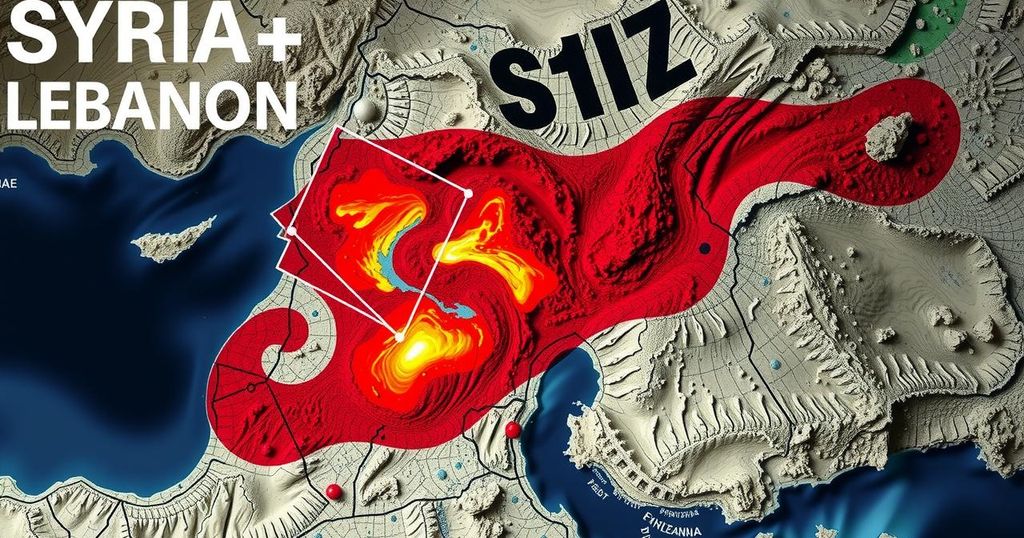The Shifting Political Dynamics in Lebanon Post-Assad’s Regime Collapse

The aftermath of the Assad regime’s fall has ignited both celebrations and political upheaval in Lebanon, particularly among the Sunni community. Islamist groups are demanding prisoner amnesties, while Hizbullah faces pressure amidst its weakened position. Lebanon’s political factions struggle to unite around a president, as fears of instability grow due to the shifting political temperatures influenced by Sunni governance in Syria, exemplifying the delicate balance of power in this historically complex region.
The political landscape in Lebanon has witnessed notable changes following the collapse of the Assad regime in Syria, which sparked significant celebrations among Sunni populations in Lebanon, particularly in cities such as Tripoli and Sidon. However, the initial euphoric response was swiftly overshadowed by demands from Sunni-led Islamist groups, particularly the Jamaah Islamiya, for the release of Sunni prisoners in Lebanese jails. On December 10, protests escalated under the leadership of Sheikh Ahmad Shemali, who asserted that their activism would intensify until their demands were met.
Heightened by the rise of Tahrir al-Sham in Syria, the Sunni community in Lebanon began to challenge the waning influence of the Shiite Hizbullah, which is struggling to maintain its authority amidst internal and external pressures. The situation is complicated further by the uncertainty surrounding political support for amnesty for imprisoned Islamists, a decision that rests with the Lebanese parliament’s speaker, Nabih Berri, a member of the Shiite Amal movement.
In response to the changing dynamics, the Shiite community’s struggle to maintain relevance becomes evident, particularly as Hizbullah confronts its diminished military stature following its failures against Israel. Tensions came to light during a crucial meeting between General Joseph Aoun, head of the Lebanese Armed Forces, and Hizbullah’s liaison Wafiq Safa, regarding the implementation of a ceasefire agreement south of the Litani River. Aoun’s expectations for compliance from Hizbullah underscore a critical juncture in which Armed Forces’ authority may come into direct contention with Hizbullah’s influence.
In the Christian political arena, divisions persist as factions vie to find a consensus presidential candidate capable of gaining widespread acceptance. The Free Patriotic Movement, led by Jibran Bassil, faces opposition from figures such as Samir Geagea and Samy Gemayel, yet no single candidate has emerged with sufficient backing to secure election.
With the Syrian regime now aligned with Sunni governance, Lebanese Sunni leaders express cautious optimism, yet fears of renewed instability linger due to potential spillover from the Syrian conflict. The shadow of ISIS’s past incursions remains fresh in the minds of Lebanese citizens, eliciting concerns over the radicalization of the Sunni community and the possible resurgence of unrest.
Amidst this backdrop, Ahmad al Sharaa, leader of the anti-Assad faction Tahrir al-Sham, publicly endorsed Joseph Aoun for the presidency, asserting that their interests do not extend to interference in Lebanese affairs. This statement suggests a temporary equilibrium, as the Syrian regime focuses on solidifying its authority domestically. Nevertheless, Lebanon remains on high alert for any emerging instability that may arise from its neighbor’s ongoing political evolution.
The article examines the shifting geopolitical and social dynamics in Lebanon in the wake of the fall of the Assad regime in Syria. Once a unifying grievance against Syrian domination, the Sunni community in Lebanon finds itself at a crossroads, now challenged by the Shiite forces of Hizbullah amid regional realignments. With the Syrian conflict’s influence permeating Lebanese politics, the article highlights key figures, their positions, and the implications of their interactions in shaping the future of both nations. As socioeconomic needs entice a powerful Sunni activism, the internal fracturing among the Lebanese factions raises questions regarding the nation’s stability and unity moving forward.
The recent political unrest in Lebanon following the collapse of the Assad regime illustrates a complex and evolving socio-political landscape. The Sunni community’s increasing assertiveness presents both opportunities and challenges, particularly in its interplay with Shiite groups such as Hizbullah. Meanwhile, the Christian camp struggles with internal divisions as it seeks a united political front. The broader implications of Syria’s Sunni leadership also add a layer of complexity to Lebanese political stability, underlining the necessity for careful navigation of these turbulent dynamics.
Original Source: jcpa.org








